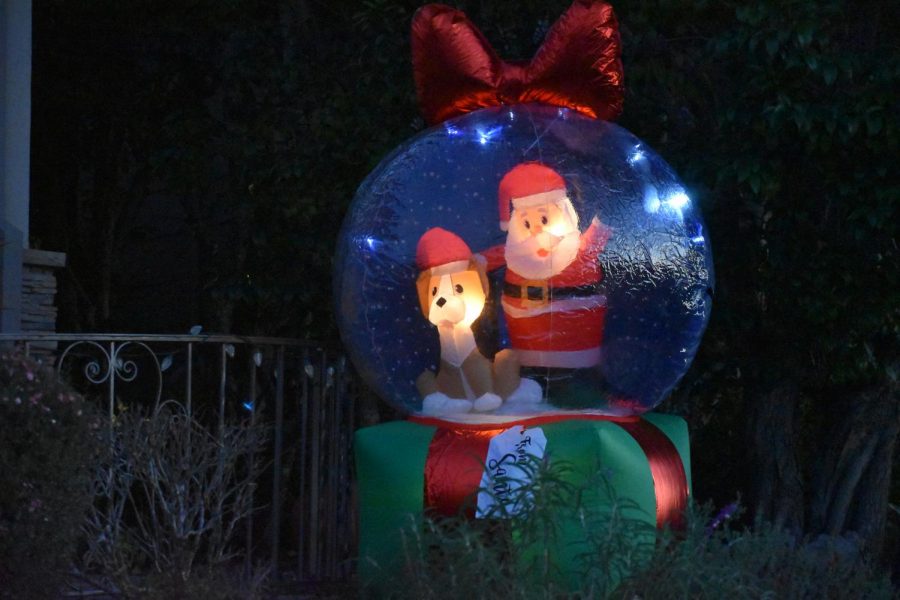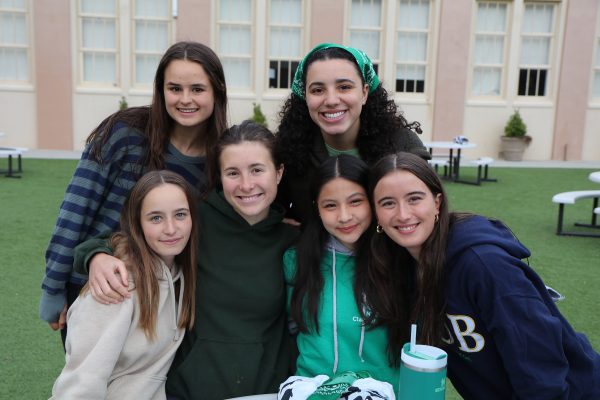The importance of make-believe Christmas traditions growing up
The Catalyst / Peyton Daley
A blow-up Santa-in-a-snow-globe sits on a festive front lawn. Decorations like this remind everyone of the days when they believed in magic.
We all know Santa Claus as the jolly man in the red hat who delivers presents through our chimneys and eats the milk and chocolate chip cookies that we set for him near the tree. Has realizing our childhood Christmas fantasies are made-up affected the true fun of the holiday?
I can vividly remember the days when the magic of Santa gave me something to look forward to. It also gave my parents an effective way of motivating me to stay off of the naughty list. I think we can agree that celebrating Christmas as children by using our imaginations and believing in the magic of the holiday gave us a creative way to celebrate the festive season.
Believing in Christmas legends such as Santa benefited our development in ways that we do not always appreciate until later in life, when our love of Christmas stays with us. When we were young, Santa Claus and other magical tales provided a safe space for our creativity and imaginations, and we remember each holiday season even if we no longer believe in the same stories.
It also gave the rest of the family a time to participate in other festivities while our thoughts were occupied by flying reindeer. Our older family members got the chance to relive their childhood memories through our beliefs.
I can tell that it made my parents happy to see my brother and I anxiously waiting for Santa Claus to come, as well as coming downstairs Christmas morning to see which presents came from Santa. The day that another classmate of mine spoiled the fantasy of Santa for me and told me how our parents are the ones really delivering presents was the day that I missed believing. Even if it seemed “uncool” to believe in Santa at that time in my life, I wanted that prior magic and excitement back. Although I still love the holidays now, I can confidently say that Christmas was more enjoyable when I used to believe in Santa.
I would not go as far as saying that it broke my heart to find out that Santa was not real, but it did hurt a little. Rather than making me frustrated at my parents for lying to me about him, it made me grateful that my parents were there to support my Christmas fantasies and give me amazing memories to look back on.
While believing in these tales may sound silly or immature now, everytime Christmas comes along all I can think back to was when I tried to find my Elf on the Shelf moving during the night, or when I attempted to spot Santa Claus collecting my Christmas wish list. These memories, although nostalgic and melancholy to think back to, made my childhood that much better. I could not imagine my youth without experiencing the true joy of Christmas through the various tales I used to believe in not too many Christmases ago.
Some people argue that toys such as Elf on the Shelf provide a way for parents to lie to their children and threaten the trustworthiness of parents. Although Christmas toys like these may get a bad reputation for this, Elf on the Shelf gives a yearly tradition for children to look forward to while encouraging them to behave.
Every year that my parents would bring out Elf on the Shelf, it made me excited waking up each morning to find the new position it went to. Even though I later found out that my parents moved the toy, I still appreciated the efforts they put into making the holiday fun and magical.
It’s the little joys like these that parents do for their children which make Christmas truly special.

Ava Marinos is a senior at NDB and is excited for her third year with The Catalyst. She actively participated in the club as a sophomore and junior and...

Peyton Daley is a senior and this is her third year as a Catalyst writer. She served as Arts & Life Editor her sophomore year and Managing Editor her...






